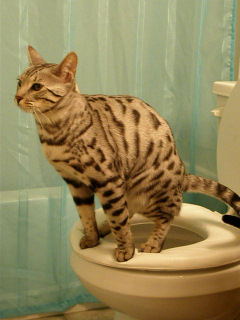Avoid Clogs and Damage: Don't Flush Cat Poop Down Your Toilet - Professional Recommendations
Avoid Clogs and Damage: Don't Flush Cat Poop Down Your Toilet - Professional Recommendations
Blog Article
How do you actually feel in regards to Don’t flush cat feces down the toilet?

Introduction
As cat owners, it's essential to bear in mind how we take care of our feline friends' waste. While it might seem hassle-free to purge feline poop down the bathroom, this technique can have detrimental effects for both the atmosphere and human health and wellness.
Environmental Impact
Flushing feline poop introduces hazardous virus and parasites into the water supply, positioning a significant risk to marine communities. These contaminants can negatively affect marine life and compromise water top quality.
Health Risks
In addition to ecological concerns, flushing pet cat waste can also present health threats to humans. Pet cat feces may consist of Toxoplasma gondii, a parasite that can cause toxoplasmosis-- a possibly severe health problem, especially for expectant women and individuals with damaged body immune systems.
Alternatives to Flushing
Fortunately, there are much safer and extra accountable methods to get rid of pet cat poop. Take into consideration the complying with options:
1. Scoop and Dispose in Trash
One of the most common technique of taking care of cat poop is to scoop it right into an eco-friendly bag and toss it in the trash. Make certain to utilize a dedicated clutter scoop and throw away the waste immediately.
2. Use Biodegradable Litter
Choose eco-friendly pet cat clutter made from products such as corn or wheat. These clutters are environmentally friendly and can be safely taken care of in the garbage.
3. Hide in the Yard
If you have a lawn, consider burying feline waste in a designated area far from vegetable yards and water resources. Be sure to dig deep adequate to stop contamination of groundwater.
4. Install a Pet Waste Disposal System
Invest in a pet dog waste disposal system particularly developed for feline waste. These systems use enzymes to break down the waste, lowering smell and environmental effect.
Conclusion
Responsible pet dog possession extends beyond offering food and shelter-- it also includes proper waste administration. By refraining from flushing cat poop down the bathroom and going with alternative disposal techniques, we can reduce our ecological footprint and secure human wellness.
Why You Should Never Flush Cat Poop Down the Toilet
A rose by any other name might smell as sweet, but not all poop is created equal. Toilets, and our sewage systems, are designed for human excrement, not animal waste. It might seem like it couldn’t hurt to toss cat feces into the loo, but it’s not a good idea to flush cat poop in the toilet.
First and foremost, assuming your cat uses a litter box, any waste is going to have litter on it. And even the smallest amount of litter can wreak havoc on plumbing.
Over time, small amounts build up, filling up your septic system. Most litter sold today is clumping; it is made from a type of clay that hardens when it gets wet. Ever tried to scrape old clumps from the bottom of a litter box? You know just how cement-hard it can get!
Now imagine just a small clump of that stuck in your pipes. A simple de-clogger like Drano isn’t going to cut it. And that means it’s going to cost you big time to fix it.
Parasitic Contamination
Believe it or not, your healthy kitty may be harboring a nasty parasite. Only cats excrete Toxoplasma in their feces. Yet it rarely causes serious health issues in the cats that are infected. Most people will be fine too if infected. Only pregnant women and people with compromised immune systems are at risk. (If you’ve ever heard how women who are expecting are excused from litter cleaning duty, Toxoplasma is why.)
But other animals may have a problem if infected with the parasite. And human water treatment systems aren’t designed to handle it. As a result, the systems don’t remove the parasite before discharging wastewater into local waterways. Fish, shellfish, and other marine life — otters in particular — are susceptible to toxoplasma. If exposed, most will end up with brain damage and many will die.
Depending on the species of fish, they may end up on someone’s fish hook and, ultimately on someone’s dinner plate. If that someone has a chronic illness, they’re at risk.
Skip the Toilet Training
We know there are folks out there who like to toilet train their cats. And we give them props, it takes a lot of work. But thanks to the toxoplasma, it’s not a good idea.

We were shown that write-up about Don’t flush cat feces down the toilet through a friend on our other web blog. If you liked our blog posting kindly make sure you remember to pass it around. Many thanks for your time spent reading it.
Free Quote Report this page